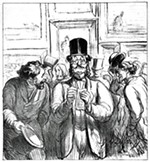Letters at 3AM: Behold The Maslin
The Maslin is not a person but, rather, a function of virtually every book-review staff in the Western world
By Michael Ventura, Fri., Jan. 29, 2010
If this paragraph were a movie trailer, a sonorous voice would intone: "Some there are who live and die for literature. Others live to kill it." Pages are flung out the window of a Manhattan condo as we hear throaty laughter, self-possessed, unconcerned, and certain of safety. Sonorously: "This is a tale of a writer, a book, and" – dark music swells – "the critic."
I am innocent of firsthand knowledge of Joshua Ferris and his second novel, The Unnamed. As far as I know, I know no one who knows Ferris. I live so far off the literary grid it's unlikely I'll meet him. I may or may not read his book. Nevertheless I offer my sword – pen, pencil, keyboard – in his defense and in defense of his volume. I do so because on page 1 of the artsy section of The New York Times, Jan. 14, Mr. Ferris and his volume got sliced up, laid out on a plate, and dined upon by The Maslin. An intellectually corrupt entity is The Maslin.
The Maslin is not a person. The Maslin is a function. The Maslin is legion. The Maslin comes in all genders, and you will find The Maslin on the book-review staff of virtually every takes-itself-seriously publication in the Western world, as well as in many a classroom of lower and higher misinformation and at each and every artsy party.
To call this entity The Maslin is merely a convenience. The function that is The Maslin could carry the name of any of its minions and malefactors. As it happens, a Janet Maslin wrote the review in question, a review like many another, so calling this function "The Maslin" is almost pure chance.
We can imagine that this particular manifestation of The Maslin smiles at children, recycles, is reasonably witty, certainly savvy, and rarely too loud at inappropriate moments. Further, she, too, so I believe, has an immortal but fragile soul and bears her share of what used to be called the "human condition" with all the grace of which she's capable, which is not easy for anybody. It is not her person but her function that is in question. She is important not as an individual but for her sameness. What distinguishes The Maslin, of which she is merely a part, is precisely its sameness.
The Maslin, or its editor, headlined the review of Mr. Ferris' volume with a tongue-in-cheek-existential "Compelled to Wander, Nowhere to Go." In the first sentence The Maslin informs us that Mr. Ferris' first novel was "charming but weightless." The Maslin the world over makes such statements without feeling responsible to convey what "charm" and "weight" might mean to itself, because the first and most defining quality of The Maslin, next to its sameness, is that it takes no personal responsibility for its judgments. It writes not as an individual but as The Maslin.
In the first sentence, then, Mr. Ferris has been damned. We don't know why, and we won't be told. (We also won't be told that his first novel, Then We Came to the End, was a National Book Award finalist.) The sentence also informs us that the "main character" in The Unnamed has a "peculiar condition": He can't stop walking. Walks compulsively 'til he drops. His condition: "Is it medical? Is it spiritual?" And there The Maslin gives something away.
The Maslin doesn't tolerate spirituality well, or, really, at all. Not in American writers. Latin Americans, Eastern Europeans, Arabs, and Russians can get away with serious writing about daily metaphysical dilemmas, but American writers had best step lightly. The Maslin's prime function is to enforce a business ethic in literature. The major organs of this materialist culture demand a materialist literature. Spiritual concerns in the novel are OK for foreigners and dead Americans (Zora Neale Hurston, Herman Melville), but if The Maslin scents a whiff of it in a living writer, you're as good as dead, literarily. The Maslin goes out of its way to embarrass the metaphysical writer because it finds the metaphysical embarrassing, which says more about The Maslin than it does about the metaphysical.
There are caveats: A brainy, satiric novel involving metaphysics may get high marks because The Maslin thinks itself brainy and feels safe laughing. Or do your metaphysics in a story that can be taken as a sort of fable, and some of The Maslin will permit praise. In both instances it plays a kind of game of taking you seriously without taking you seriously, and it uses words like "postmodern" or compares you to Thomas Pynchon – it doesn't get you, but it may praise you. Do your metaphysics in a more or less realist fashion, and The Maslin balks. The Maslin's unshakeable literary belief is that what it knows, or rather what it thinks, is all there is.
Back to the review. The Maslin goes on to inform us that Mr. Ferris "gives The Unnamed a writerly preciousness," and his "syntax" is "adorable." It's a shame there's no adequate masculine or genderless usage meaning "bitchy," because "bitchy" sounds sexist. (The masculine "bastardly" conveys something utterly different.) I'm as sexist as the next fellow, I suppose, but to say The Maslin is being bitchy is something else again. The Maslin has no sex (that's the thing about sameness); its bitchy ways are employed regardless of genital equipage. What's interesting here is the assumption beneath the bitchiness.
That assumption is, again, a business ethic transferred to literature. Digression, nuance, and loveliness have no place in a business meeting or on a spreadsheet. Business is minimalist. The Maslin attempts to enforce minimalism. William Shakespeare, Fyodor Dostoevsky, Henry Fielding, Henry Miller, they're all safely dead and can digress, nuance, and be lovely with The Maslin's reluctant but general approval. It's equally permissible to be postmodernly incomprehensible because that's seen as cool, and there's nothing The Maslin likes more than identifying with what's cool. (See it coo over Patti Smith's memoir, Jan. 18.) But turn a sentence this way and that for the hell of it, the fun of it, the loveliness of it, the gloryness of it, while you tell a more or less realistic tale, and The Maslin becomes secretly afraid. The Maslin writes plain. Because it can do nothing else. The Maslin, believing itself a realist, makes a realist writer pay for doing what it cannot.
"Mr. Ferris writes prettily, too prettily," quoth The Maslin, citing sentences out of context to prove its point. Even Shakespeare can look a fool quoted out of context. (Said Mad magazine, "To be or not to be – this is a question?") Mr. Ferris writes of the "armies of God," he writes of the "body and soul," and – without telling what Ferris writes of the body and soul – The Maslin presents this as sufficient reason for damnation. Ferris writes "charmingly" of "an unseen, undefinable threat." This The Maslin cannot tolerate. The Maslin no doubt thinks itself charming enough, but "unseen" and "indefinable" bring down real estate values. According to The Maslin, Mr. Ferris' novel goes "pitiful when he turns out to have given [his characters] no real way to withstand a biblical degree of suffering and sorrow."
That there may be no "real" way to withstand some sufferings and sorrows is what The Maslin cannot afford to consider. "Uplift The Maslin!" is The Maslin's cry to literature.
For all I know, the book stinks. My point is that The Maslin wasn't writing about the book. It wrote, and always writes, to enforce its dicta.
"It's too easy to shrug off what happens in The Unnamed without imagining that it could happen to you." So ends The Maslin's review. And there a truth is revealed: If it cannot happen to The Maslin, it is not real.
The Maslin demands of literature a reflection of itself. The Maslin rejects what cannot be, or happen to, itself. Literature for The Maslin is itself.
Intellectually corrupt, confined, conformed, co-opted, convinced, its prose invincibly plain – that is The Maslin. An entity enormous but for its littleness.










